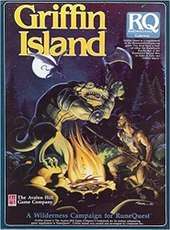Griffin Island (RuneQuest)
Griffin Island is a licensed supplement published by The Avalon Hill Game Company in 1986 for the fantasy role-playing game RuneQuest published by Chaosium.

Contents
In 1981, Chaosium published its first RuneQuest supplement, Griffin Mountain, set in the campaign world of Glorantha, specifically the wilderness surrounding the city of Balazar.[1] Five years later, Avalon Hill published a licensed revision and expansion called Griffin Island written by Rudy Kraft, Paul Jaquays, Greg Stafford, and Sandy Petersen, with interior art by Paul Jaquays, and cover art by Steve Purcell.[1] The result was a boxed set with
- a 32-page Gamemaster Book,
- a 52-page Scenario Book,
- a 28-page book of Players' Handouts,
- a 32" x 22" map of the island on which the setting takes place.[2]
Because Avalon Hill was licensed to produce material for RuneQuest, but not for the world of Glorantha, the original wilderness setting of Griffin Mountain was changed to an isolated island that could be transposed into any RuneQuest campaign setting.[1]
Material included in the books include background material, notes for gamemasters, various encounters, notable personalities and both short adventures and adventure hooks that can be developed into major adventures.[1]
Reception
In the September 1986 edition of White Dwarf (Issue #81), Robert Neville had a few quibbles, complaining about the changes made to the names of monsters and deities in order to move the material out of the world of Glorantha. He also thought the map's text should have looked more "ancient" rather that using typset text. He concluded that for those with the old Griffon Mountain supplement, this new product was not necessary. But for those who did not already own it, Neville suggested, "Griffin Island is very highly recommended to everyone who hasn't a copy of the original."[3]
In the October 1987 edition of Dragon (Issue #126), Ken Rolston lamented the loss of the world of Glorantha, but admitted that "it is with resigned enthusiasm that I salute the adaptation of the Gloranthan Griffin Mountain material to more generic fantasy conventions." Rolston applauded the quality of work, saying, "The campaign background material, game-master staging notes, minor encounters, and scenarios are exceptionally well-done. For the most part, the classic setting and narrative values of the original have been preserved or enhanced." He also liked the short adventures that were included, commenting that "The best things about the scenario resources are their brevity and variety - perfect for an evening’s entertainment, easily reviewed and understood by the GM, with good maps and simple text descriptions." He concluded with a strong recommendation, saying, "The excellent presentation of the player handouts enhances the already superior quality of the campaign and adventure material, and fine presentation of the original Griffin As the only representative of a classic line of campaign supplements still is an essential part of any fantasy role-player’s library. Newcomers to Chaosium’s campaign-supplement presentation wizardry will marvel at its excellence. Old fans of the out-of-print Gloranthan supplements must resist nostalgic comparisons with the good old days and recognize Griffin Island for what it is: the best contemporary fantasy campaign supplement."[1]
In the November 1987 edition of Space Gamer/Fantasy Gamer (Issue No. 80), Tim Robinson commented that "the game is an excellent buy if you play RuneQuest. It is useful to a GM who has a campaign established, or to the GM who wants to begin a campaign game using RuneQuest. Griffin Island has a good background, some excellent scenarios, and some new, interesting creatures. I recommend this supplement for anyone interested in some enjoyable role-playing."[2]
Other reviews
- Adventurer #4 (Oct., 1986)
- Casus Belli #34 (Aug 1986)
References
- Rolston, Ken (October 1987). "Role-playing reviews". Dragon. TSR, Inc. (126): 9–10.
- Robinson, Tim (October–November 1987). "Griffin Island". Space Gamer/Fantasy Gamer. Diverse Talents, Incorporated (80): 36.
- Neville, Robert (September 1986). "Open Box". White Dwarf. Games Workshop (81): 3.